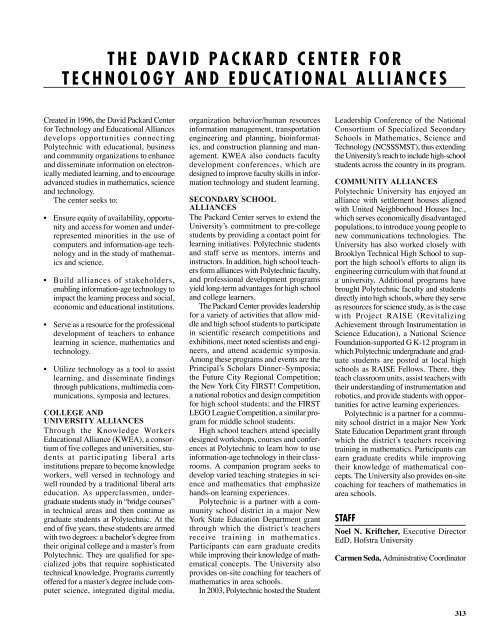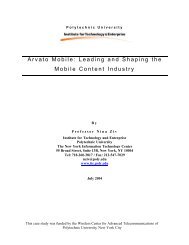POLYTECHNIC UNIVERSITY 2005-2007
POLYTECHNIC UNIVERSITY 2005-2007
POLYTECHNIC UNIVERSITY 2005-2007
Create successful ePaper yourself
Turn your PDF publications into a flip-book with our unique Google optimized e-Paper software.
THE DAVID PACKARD CENTER FOR<br />
TECHNOLOGY AND EDUCATIONAL ALLIANCES<br />
Created in 1996, the David Packard Center<br />
for Technology and Educational Alliances<br />
develops opportunities connecting<br />
Polytechnic with educational, business<br />
and community organizations to enhance<br />
and disseminate information on electronically<br />
mediated learning, and to encourage<br />
advanced studies in mathematics, science<br />
and technology.<br />
The center seeks to:<br />
• Ensure equity of availability, opportunity<br />
and access for women and underrepresented<br />
minorities in the use of<br />
computers and information-age technology<br />
and in the study of mathematics<br />
and science.<br />
• Build alliances of stakeholders,<br />
enabling information-age technology to<br />
impact the learning process and social,<br />
economic and educational institutions.<br />
• Serve as a resource for the professional<br />
development of teachers to enhance<br />
learning in science, mathematics and<br />
technology.<br />
• Utilize technology as a tool to assist<br />
learning, and disseminate findings<br />
through publications, multimedia communications,<br />
symposia and lectures.<br />
COLLEGE AND<br />
<strong>UNIVERSITY</strong> ALLIANCES<br />
Through the Knowledge Workers<br />
Educational Alliance (KWEA), a consortium<br />
of five colleges and universities, students<br />
at participating liberal arts<br />
institutions prepare to become knowledge<br />
workers, well versed in technology and<br />
well rounded by a traditional liberal arts<br />
education. As upperclassmen, undergraduate<br />
students study in “bridge courses”<br />
in technical areas and then continue as<br />
graduate students at Polytechnic. At the<br />
end of five years, these students are armed<br />
with two degrees: a bachelor’s degree from<br />
their original college and a master’s from<br />
Polytechnic. They are qualified for specialized<br />
jobs that require sophisticated<br />
technical knowledge. Programs currently<br />
offered for a master’s degree include computer<br />
science, integrated digital media,<br />
organization behavior/human resources<br />
information management, transportation<br />
engineering and planning, bioinformatics,<br />
and construction planning and management.<br />
KWEA also conducts faculty<br />
development conferences, which are<br />
designed to improve faculty skills in information<br />
technology and student learning.<br />
SECONDARY SCHOOL<br />
ALLIANCES<br />
The Packard Center serves to extend the<br />
University’s commitment to pre-college<br />
students by providing a contact point for<br />
learning initiatives. Polytechnic students<br />
and staff serve as mentors, interns and<br />
instructors. In addition, high school teachers<br />
form alliances with Polytechnic faculty,<br />
and professional development programs<br />
yield long-term advantages for high school<br />
and college learners.<br />
The Packard Center provides leadership<br />
for a variety of activities that allow middle<br />
and high school students to participate<br />
in scientific research competitions and<br />
exhibitions, meet noted scientists and engineers,<br />
and attend academic symposia.<br />
Among these programs and events are the<br />
Principal’s Scholars Dinner–Symposia;<br />
the Future City Regional Competition;<br />
the New York City FIRST! Competition,<br />
a national robotics and design competition<br />
for high school students; and the FIRST<br />
LEGO League Competition, a similar program<br />
for middle school students.<br />
High school teachers attend specially<br />
designed workshops, courses and conferences<br />
at Polytechnic to learn how to use<br />
information-age technology in their classrooms.<br />
A companion program seeks to<br />
develop varied teaching strategies in science<br />
and mathematics that emphasize<br />
hands-on learning experiences.<br />
Polytechnic is a partner with a community<br />
school district in a major New<br />
York State Education Department grant<br />
through which the district’s teachers<br />
receive training in mathematics.<br />
Participants can earn graduate credits<br />
while improving their knowledge of mathematical<br />
concepts. The University also<br />
provides on-site coaching for teachers of<br />
mathematics in area schools.<br />
In 2003, Polytechnic hosted the Student<br />
Leadership Conference of the National<br />
Consortium of Specialized Secondary<br />
Schools in Mathematics, Science and<br />
Technology (NCSSSMST), thus extending<br />
the University’s reach to include high-school<br />
students across the country in its program.<br />
COMMUNITY ALLIANCES<br />
Polytechnic University has enjoyed an<br />
alliance with settlement houses aligned<br />
with United Neighborhood Houses Inc.,<br />
which serves economically disadvantaged<br />
populations, to introduce young people to<br />
new communications technologies. The<br />
University has also worked closely with<br />
Brooklyn Technical High School to support<br />
the high school’s efforts to align its<br />
engineering curriculum with that found at<br />
a university. Additional programs have<br />
brought Polytechnic faculty and students<br />
directly into high schools, where they serve<br />
as resources for science study, as is the case<br />
with Project RAISE (Revitalizing<br />
Achievement through Instrumentation in<br />
Science Education), a National Science<br />
Foundation-supported G K-12 program in<br />
which Polytechnic undergraduate and graduate<br />
students are posted at local high<br />
schools as RAISE Fellows. There, they<br />
teach classroom units, assist teachers with<br />
their understanding of instrumentation and<br />
robotics, and provide students with opportunities<br />
for active learning experiences.<br />
Polytechnic is a partner for a community<br />
school district in a major New York<br />
State Education Department grant through<br />
which the district’s teachers receiving<br />
training in mathematics. Participants can<br />
earn graduate credits while improving<br />
their knowledge of mathematical concepts.<br />
The University also provides on-site<br />
coaching for teachers of mathematics in<br />
area schools.<br />
STAFF<br />
Noel N. Kriftcher, Executive Director<br />
EdD, Hofstra University<br />
Carmen Seda, Administrative Coordinator<br />
313




